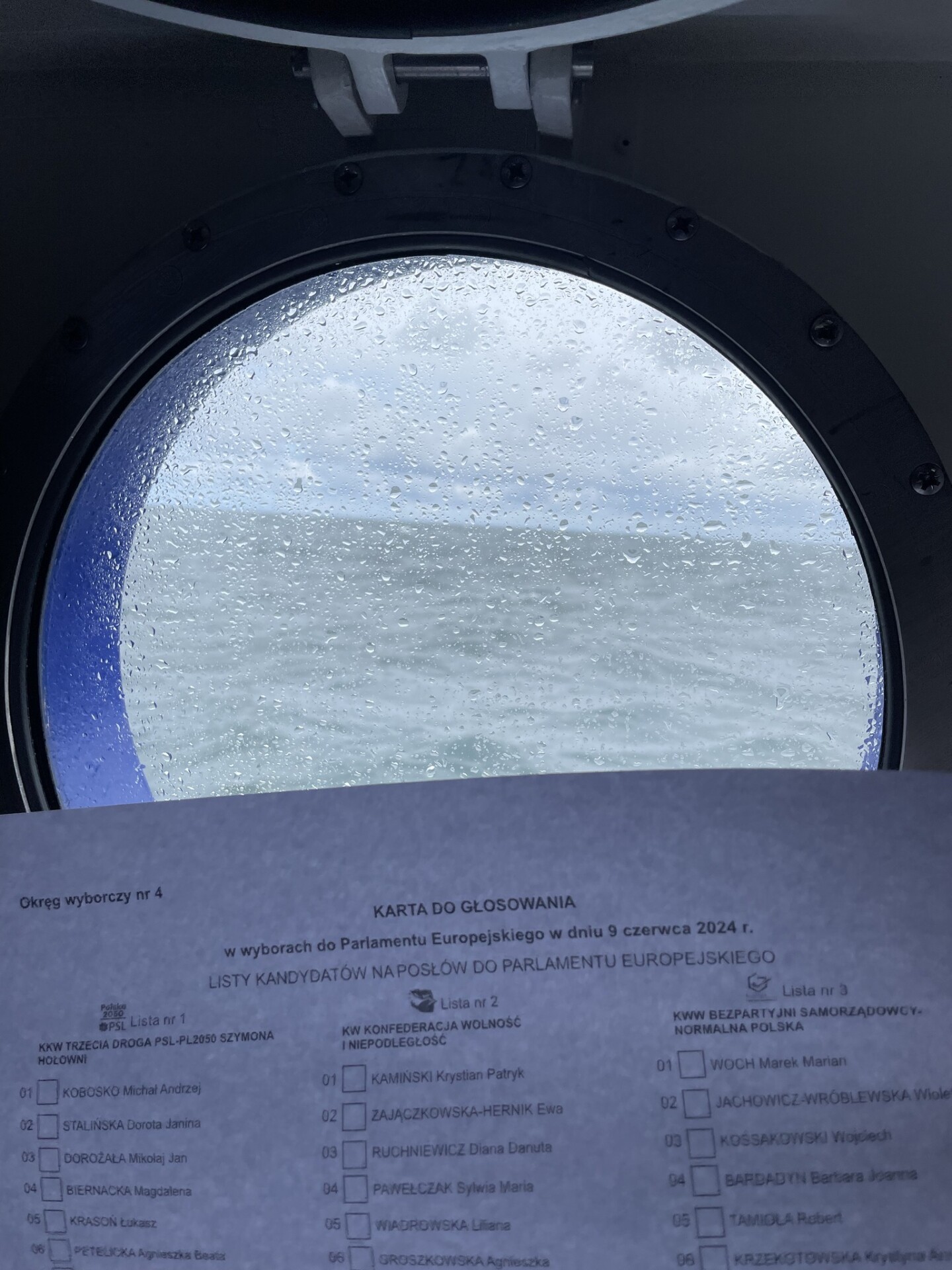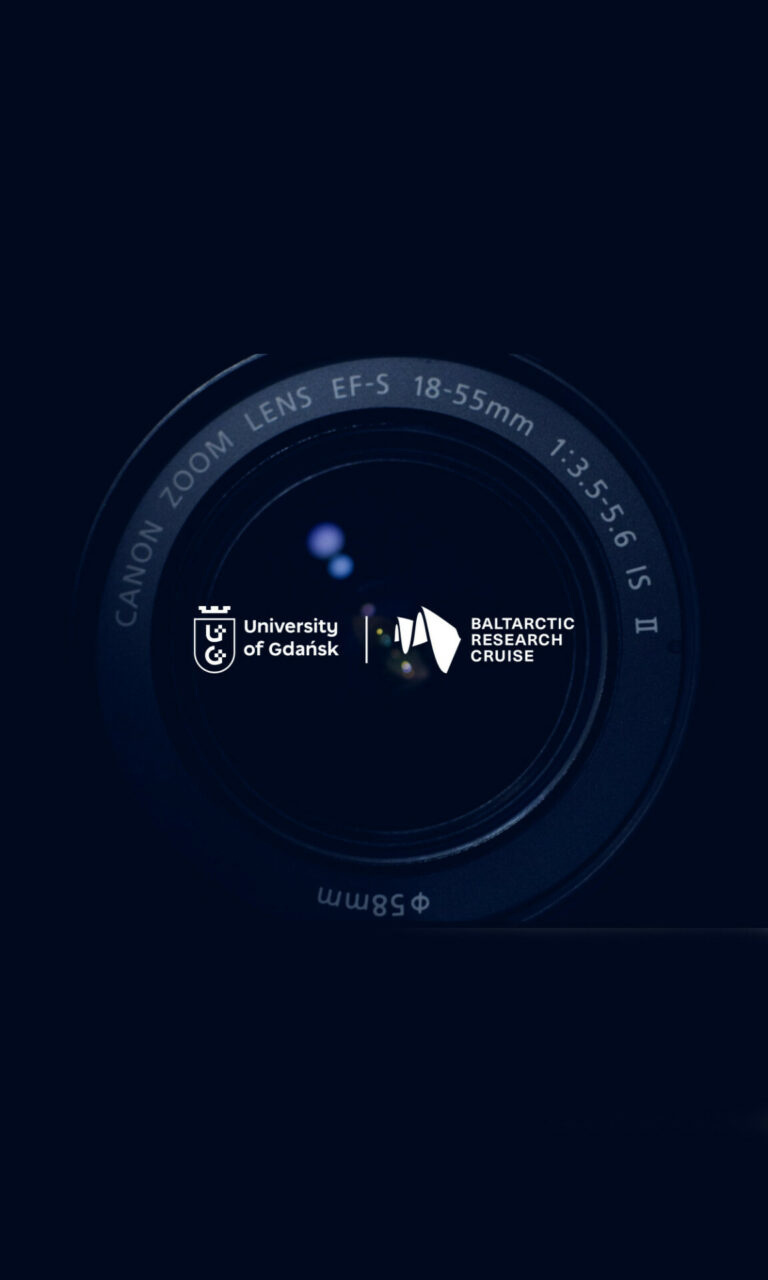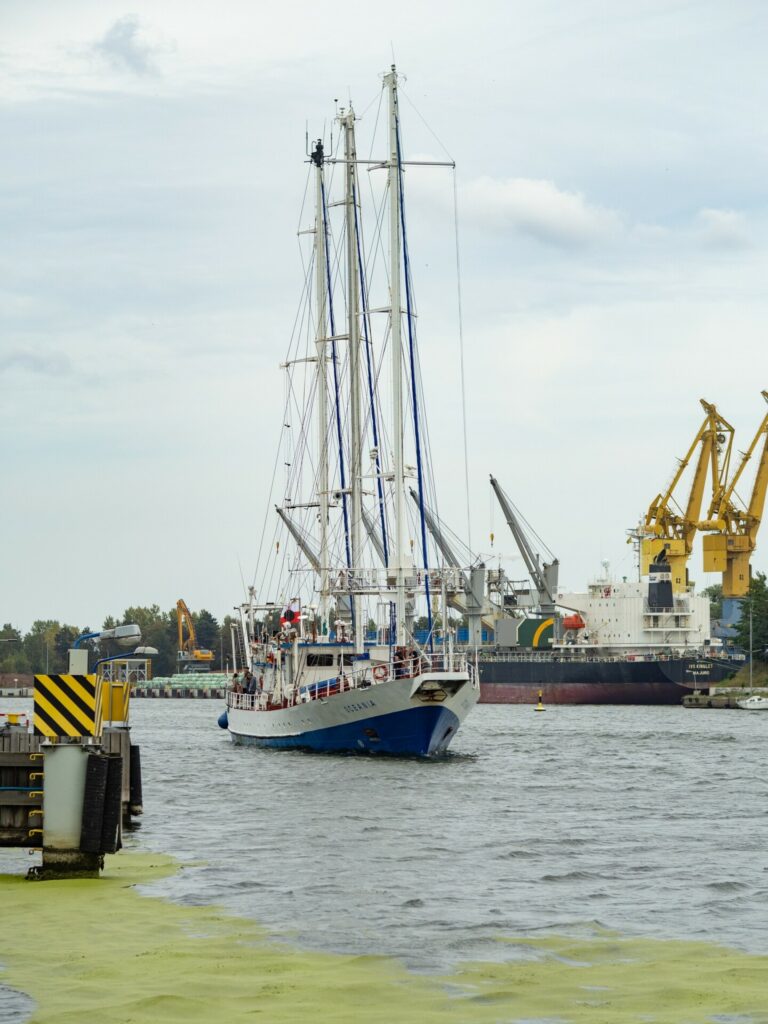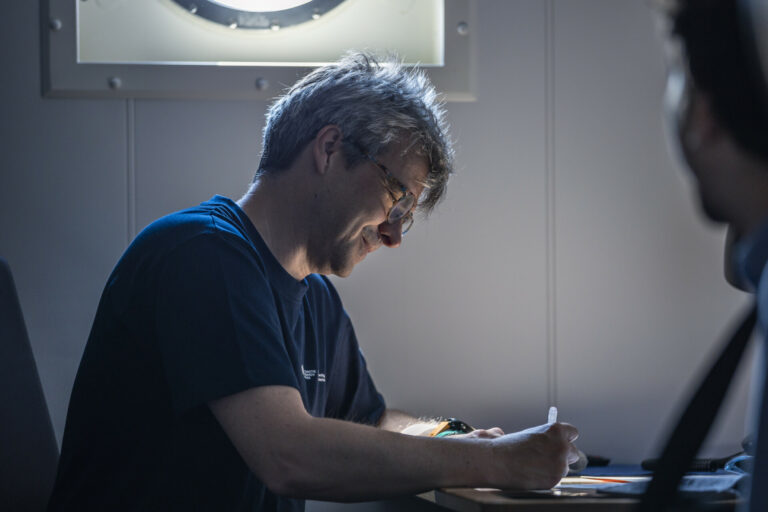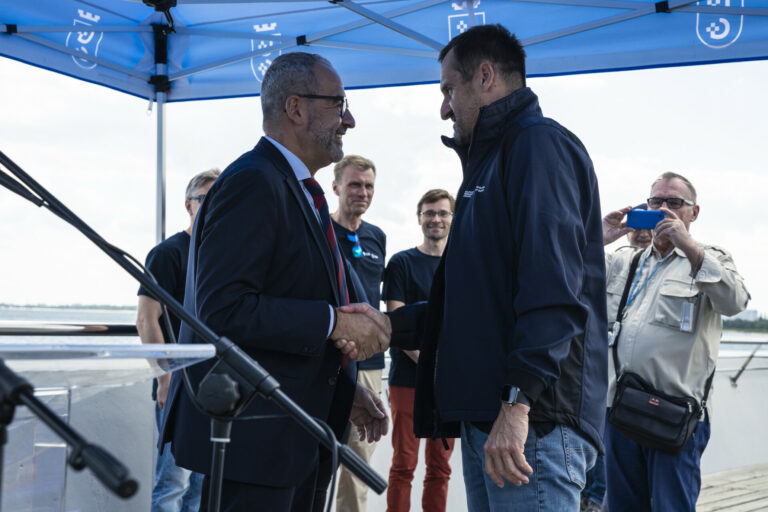Want to make the ocean laugh, tell it your plans. On the morning of the eighth day of the expedition, we should be sampling off the coast of Norway, and we are standing huddled with twenty other ships behind the tip of Jutland waiting for good weather. Just above our car park in the Skagerrak Strait, evil lurks, in the form not so much of a strong wind, but of the waves that have been rushing through the Atlantic for days.
A couple of years ago, I managed to get myself on a cruise with a shipload of steel from the Netherlands to Canada. When I was arranging dates, buying plane tickets and so on, I was at first surprised to find that every correspondence with the shipowner and the captain bore the letters AGW WP. Which deciphered as ‘All Going Well Weather Permitting’. That is to say, in the schedule, the eighth of May, eighteen fifteen o’clock, but in fact perhaps on the night three days later, because AGW WP, that is, only if all goes well and the weather permits.
Just at the time of that cruise, nothing was going well, the weather did not allow anything, and a theoretical ten-day trip turned into a five-week adventure.
Because, to reiterate, if you want to make the ocean laugh, tell it your plans. That’s why I like sailing, every voyage shows me my place in the ranks and cures me of my mania for grandeur. In everyday life, it is easy to believe that the world rests on our shoulders, that we have control over everything, that we only need to want more and try harder to embrace the chaos.
This is an illusion, but if we squint a little – it even looks plausible. At sea, squinting won’t help, we can try and grit our teeth to our heart’s content, but ultimately the ocean dictates the terms. Even otherwise, dictatorship assumes that the ocean treats us as subjects over whom it wants to rule. Meanwhile, the ocean just is. And we can only adapt in humility.
A very valuable lesson, especially now, when we believe that the sum of emails, text messages, conversations and hours of therapy will make everything in our lives exactly the way we want it to be.
Well, it won’t.
We already knew the bad prognosis when we set sail from Kiel. The next day we still managed to do some research off the south coast of Sweden, but during the night, after we had passed Hamlet Castle in Helsingor, unpleasant waves hit the side, so unpleasant that instead of sleeping, we fell into strange half-sleeps. Yesterday morning the wind was gaining strength, the sea was rising, the science team managed to do some research near Sweden, and then we sped off against the wind and waves to the east, seeking shelter in the shadow of Denmark.
“We sped” means at five knots, or less than ten kilometres per hour. On land we would be overtaken by a pensioner riding his bicycle uphill. Because, hmm, the Oceaonograf is a great research vessel, but hardly has the soul of an adventurer.
So we wait. It’s slowly clearing up and calming down, it looks like we’re about to set off for Kristiansand – Norway’s southernmost major city.
Yesterday was Sunday, a day full of activities. Not only was there broth for lunch, but the Europarliament elections after lunch. By law, an election committee can be officially arranged on a sea-going ship and so it was, the captain was of course the chairman, we had a ballot box and official ballots. I go to every election, but putting my crosshairs up in a cabin overlooking the North Sea – nothing quite beats that.
Seventeen people voted (out of seventeen eligible, a 100 per cent turnout!), and a little jokingly and a little seriously we talked about the atmosphere after the results were announced. That we would, however, glance at each other suspiciously, who was a raging leftist and who was an extreme rightist.
But as I wrote earlier, the ocean is a reminder of what is important. Someone on the left, someone on the right, and all equally gazing at the wind gauge and the weather forecast. The shared crew is a reminder of times long gone, when we were different yet still managed to like and get along with each other.
In the next episode we’ll talk about what’s really going on here, or how many krakens can fit in a drop of water.
R/V Oceanograf
BaltArctic Research Cruise, Day 8
11 June 2024
PS. The night here at the end of Denmark is now just over six hours long.
AGW WP
Parking dla statków • Oceaniczna kozetka • Nie każdy jest poszukiwaczem przygód • Eurowybory na morzu
Chcesz rozśmieszyć ocean, opowiedz mu o swoich planach. Rankiem ósmego dnia wyprawy powinniśmy pobierać próbki u wybrzeży Norwegii, a stoimy przytuleni z dwudziestoma innymi statkami za czubkiem Jutlandii i czekamy na pogodę. Zaraz powyżej naszego parkingu w cieśninie Skagerrak czai się zło, w postaci nie tyle silnego wiatru, co rozpędzanych przez ten wiatr od wielu dni na Atlantyku fal.
Kilka lat temu udało mi się zabrać na rejs statkiem z ładunkiem stali z Holandii do Kanady. Kiedy ustalałem terminy, kupowałem bilety lotnicze i tak dalej, na początku byłem zdziwiony, że każda korespondencja z armatorem i kapitanem opatrzona jest literkami AGW WP. Co rozszyfrowano jako „All Going Well Weather Permitting”. Czyli w rozpisce ósmy maja, godzina osiemnasta piętnaście, ale tak naprawdę być może w nocy trzy dni później, bo AGW WP, czyli tylko wtedy, jeśli wszystko pójdzie dobrze i pogoda pozwoli.
Akurat w czasie tamtego rejsu nic nie szło dobrze, pogoda na nic nie pozwalała, a teoretycznie dziesięciedniowa wycieczka zamieniła się w pięciotygodniową przygodę.
Ponieważ, powtórzmy, jeśli chcesz rozśmieszyć ocean, opowiedz mu o swoich planach. Dlatego lubię żeglować, każdy rejs pokazuje mi miejsce w szeregu i leczy z manii wielkości. W codziennym życiu łatwo uwierzyć, że świat spoczywa na naszych barkach, że nad wszystkim mamy kontrolę, że wystarczy bardziej chcieć i mocniej się starać, żeby ten chaos ogarnąć.
Oczywiście jest to złudzenie, ale jak trochę zmrużymy oczy – wygląda nawet wiarygodnie. Na morzu mrużenie oczu nic nie da, możemy się starać i zagryzać zęby do woli, ale ostatecznie to ocean dyktuje warunki. Nawet inaczej, dyktatura zakłada, że ocean traktuje nas jak poddanych, nad którymi chce zapanować. Tymczasem ocean po prostu jest. A my możemy się tylko i wyłącznie w pokorze dostosować.
Bardzo cenna lekcja, zwłaszcza teraz, kiedy wierzymy, że suma maili, smsów, rozmów i godzin terapii sprawi, że wszystko będzie w naszym życiu dokładnie tak, jak tego chcemy.
Otóż nie będzie. Być może, AGW WP.
Już wypływając z Kilonii znaliśmy złą prognozę. Następnego dnia udało się jeszcze zrobić badania przy południowym wybrzeżu Szwecji, ale w nocy, po wyjściu ponad zamek Hamleta w Helsingorze w burtę walnęła nieprzyjemna fala, na tyle nieprzyjemna, że zamiast spać, zapadaliśmy w dziwne półdrzemki. Wczoraj rano wiatr tężał, morze rosło, ekipie naukowej udało się zrobić kilka badań koło Szwecji, a potem czym prędzej ruszyliśmu pod wiatr i fale na wschód, szukając schronienia w cieniu Danii.
„Czym prędzej” czyli z prędkością pięciu węzłów, czyli niecałych dziesięciu kilometrów na godzinę. Na lądzie wyprzedziłby nas emeryt, jadący na rowerze pod górkę. Ponieważ, hmm, jest Oceanograf wspaniałym statkiem badawczym, ale raczej nie ma duszy poszukiwacza przygód.
Czyli czekamy. Pomału się przejaśnia i uspokaja, wygląda na to, że zaraz ruszymy w stronę Kristiansand – najbardziej na południe wysuniętego dużego miasta Norwegii.
Wczoraj niedziela, dzień pełen atrakcji. Nie dość, że na obiad rosół, to po obiedzie eurowybory. Zgodnie z prawem na statku morskim można oficjalnie urządzić komisję wyborczą i tak też się stało, kapitan oczywiście był przewodniczącym, mieliśmy urnę i karty do głosowania. Chodzę na każde wybory, ale stawianie oficjalne krzyżyka w kabinie z widokiem na Morze Północne – tego raczej nic nie przebije.
Głosowało siedemnaście osób (z siedemnastu uprawnionych, stuprocentowa frekwencja!), trochę żartem, a trochę serio rozmawialiśmy o atmosferze po ogłoszeniu wyników. Że jednak będziemy na siebie zerkać podejrzliwie, kto jest szalonym lewakiem, a kto skrajną prawicą.
Ale jak pisałem wcześniej, ocean przypomina o tym, co ważne. Ktoś na lewo, ktoś na prawo, a wszyscy tak samo wpatrzeni we wskaźnik siły wiatru i prognozę pogody. Wspólna załoga przypomina o dawno minionych czasach, kiedy się różniliśmy, a jednocześnie ciągle potrafiliśmy się lubić i dogadywać ze sobą.
W następnym odcinku o tym, co się tutaj tak naprawdę wyprawia, czyli ile krakenów zmieści się w kropli wody.
R/V Oceanograf
BaltArctic Research Cruise, Dzień 8
11 czerwca 2024
PS. Noc tutaj na końcu Danii trwa już niewiele ponad sześć godzin.
